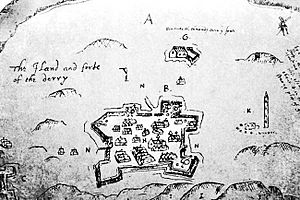George Paulet (1553–1608) facts for kids
Quick facts for kids
Sir George Paulet
|
|
|---|---|
| Born |
George Paulet
1553 Crondall, Hampshire
|
| Died | 1608 |
| Occupation | Governor of Derry |
| Spouse(s) | Jane Kyme |
| Children | Frances |
| Parent(s) | Sir George Paulet Elizabeth Windsor |
Sir George Paulet (1553–1608) was an English soldier and leader. He was also known as Pawlett, Pawlet, or Powlet. He served as the governor of Derry in Ireland. His rude and arrogant actions led to a major event called O'Doherty's Rebellion in 1608. Paulet was killed by the rebels during the Burning of Derry.
Contents
Early Life and Family
Birth and Education
George Paulet was born in 1553 in England, in a place called Crondall, Hampshire. His father was also named Sir George Paulet, and his mother was Elizabeth Windsor. George had many brothers and sisters.
He went to school at Eton College from 1564 to 1572. After that, he studied at King's College, Cambridge, from 1572 to 1575. People at the time described him as a gentleman from Hampshire.
Marriage and Children
Before 1586, George Paulet married Joan Kyme. She was the daughter of Richard Kyme from Lewes, Sussex. George and Joan had a son and a daughter named Frances. We don't know much about their son.
Life in Public Service
Justice of the Peace
From 1593 to 1601, Paulet worked as a Justice of the peace in Hampshire. A Justice of the Peace is a local official who helps keep law and order.
Governor of Derry
In 1606, King James I appointed George Paulet as the governor of Derry in Ireland. This appointment was partly due to his service in wars and the help of his cousin, the Marquess of Winchester. Paulet took over from the previous governor, Henry Docwra.
Paulet bought land and a house in Derry from Docwra. He also took over a company of soldiers. However, he quickly started having disagreements with others. Sir Arthur Chichester, who was the Lord Deputy of Ireland (a high-ranking official), thought Paulet was not good for the job. Paulet also argued with the new bishop of Derry, George Montgomery, about land.
In 1607, George Paulet was made a knight, which means he was given the title "Sir."
O'Doherty's Rebellion
Rising Tensions
In 1607, two important Irish leaders, Hugh Ó Neill and Rory Ó Donnell, left Ireland. This made other local chiefs, like Sir Cahir O'Doherty of Inishowen, come under suspicion from the English government.
Paulet had different ideas about how to deal with these chiefs compared to the previous governor. There were reports that O'Doherty was preparing for rebellion. Paulet tried to seize O'Doherty's castle, Burt Castle, when O'Doherty was away. He then falsely accused O'Doherty of treason.
O'Doherty went to Dublin to explain himself to Lord Deputy Chichester. Chichester accepted his explanations but was still unsure. An order was given to return O'Doherty's ancestral lands, but this order arrived too late.
The Attack on Derry
The Annals of the Four Masters, a historical record, says that Paulet hit O'Doherty. Other accounts suggest Paulet insulted O'Doherty, which made him very angry and led to the rebellion. Paulet was also careless and did not keep a good watch, even though Chichester warned him.
On the night of April 18, 1608, O'Doherty, with fewer than a hundred men, used a trick to capture a small fort called Culmore. An hour before dawn, they surprised Derry itself. Paulet was killed by O'Doherty's foster-father, Phelim Reagh MacDavitt. The city was then attacked and burned. Some reports say Paulet fought bravely, but the English government later said he showed cowardice.
Aftermath
Even though the rebels had early success at Derry, O'Doherty's Rebellion was quickly defeated by the government in Dublin. A force was sent to recover the ruins of Derry, and O'Doherty was killed at the Battle of Kilmacrennan.
Paulet's wife was with him in Derry during the attack. She was held captive by the O'Doherties for a short time. After her husband's death, she became very poor, but she received some help from confiscated lands. She was still alive in 1617.
 | Leon Lynch |
 | Milton P. Webster |
 | Ferdinand Smith |


